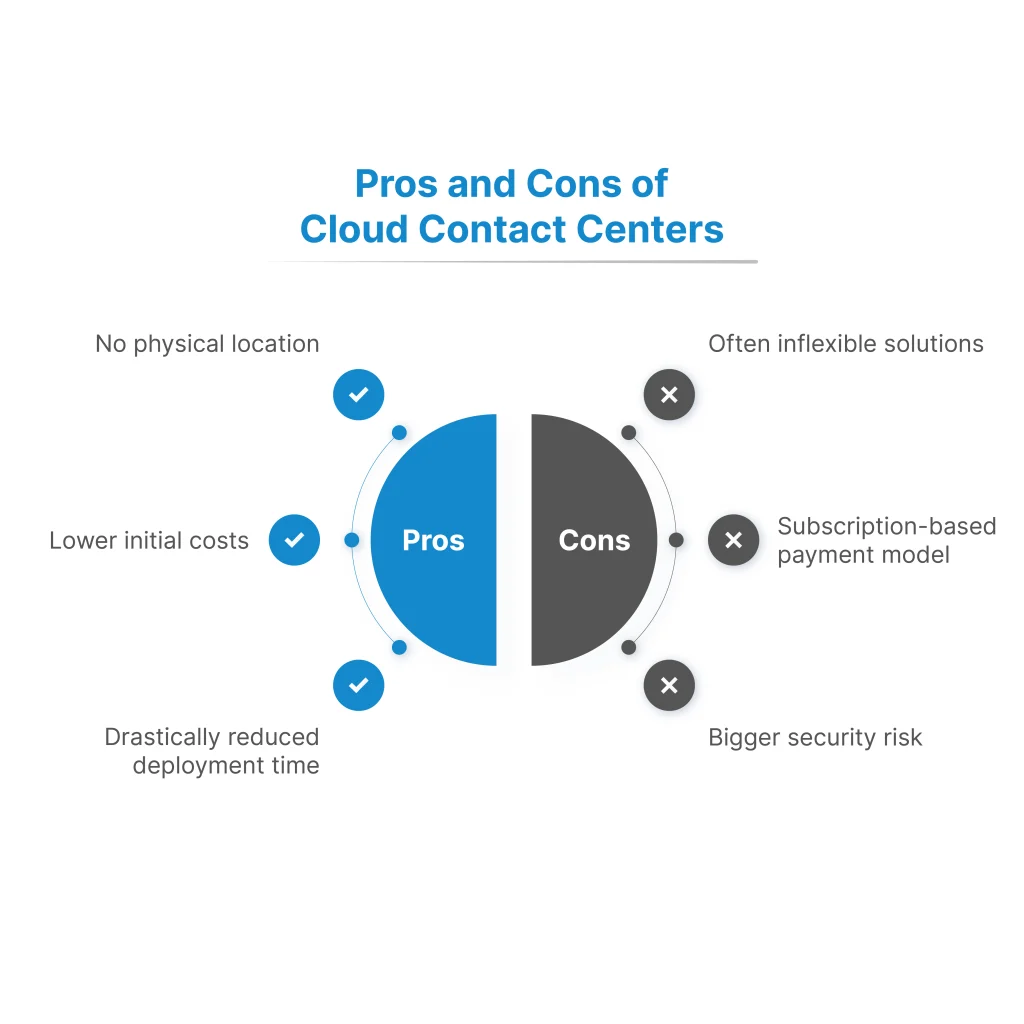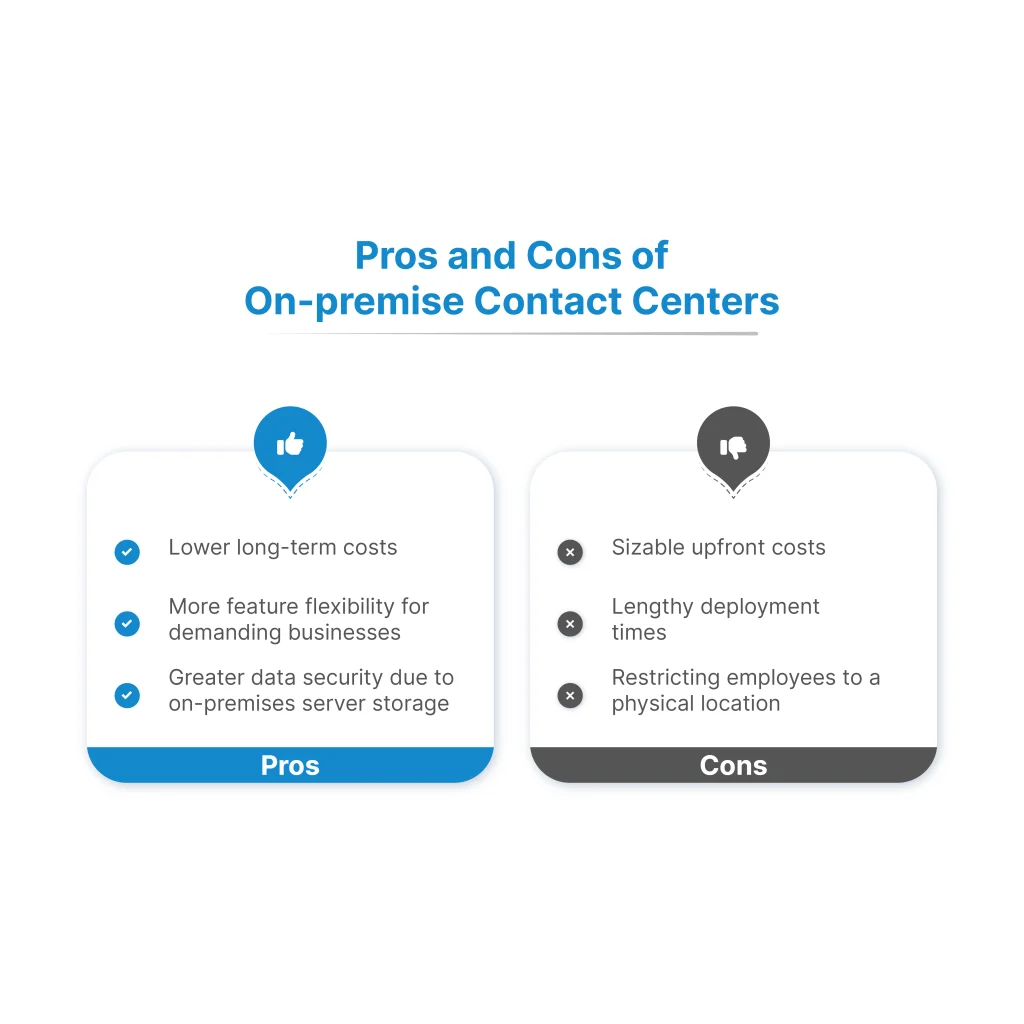When considering a business, you must realize your client’s specific preferences and their current capabilities and work around the presented issues to deliver the best suitable offer.
One such issue revolves around contact center setup, a key part of any successful business infrastructure that wishes to gain feedback from and interact with customers.
Depending on the amount of resources that businesses are willing to invest in hosting their contact centers, they get to choose between two base contact center solutions, ones managed on the cloud or ones hosted on-premise.
The former is the more modern of the two, but each of them have their own distinct advantages and caveats which the other helps fulfill.
These are things the business is going to need to be aware of when leveraging their options to find what the best solution for it is, so let us find out what each one of them offers and which of them fits best with what kind of business.
What Is A Contact Center?
“...The middleman between business and customer…”
First things first, though, we need to learn what a contact center stands for in a business sense.
Contact centers are the middleman between business and customer, a link that humanizes it by providing customers with assistance around services revolving around the company’s products.
It covers all customer interaction, be it tech support and service status updates or promoting a new product and gathering customer data to improve service quality in the future.
And, all of it is done across every communication channel (or at least the ones that they are equipped to handle) with the preferred option nowadays being an omnichannel solution, if the business can afford one.
With the main definition out of the way, it is time to turn our attention toward today’s main topics, cloud & on-premise contact center solutions and their key pros (and cons).
Cloud Contact Center

Cloud contact centers are solutions offered and hosted by a third party on the cloud.
These can usually be labeled as CCaaS (Contact Center as a Service).
No Physical Location
The main selling point of the cloud contact center is the lack of a physical location, meaning there is no need to invest a sizable sum into constructing one as everything is handled online.
Lower Overhead Costs And Modern Work Practices
This not only benefits the business itself with reduced operating costs and lower overhead investment, but it also ensures employee satisfaction by not having to commute long distances to get to work and adapting to the more modern, work-from-home or hybrid work practices.
Larger Employee Pool To Choose From
This, in turn, also allows the business to pick from a wider selection of candidates, vastly improving overall employee quality.
All of these will subsequently lead to increased customer satisfaction too which is nothing but good news for the business in question and its brand.
Out-of-the-box Solutions
The benefits of the cloud also translate to speed of setup due to the lack of a physical location. A cloud contact center can be deployed and ready to use within minutes and with minimal service downtime.
Scale To Fit
The ease of setup translates over to ease of scale as adding new lines takes but a few seconds on the dashboard and they will be ready to go, unlike the tedious, physical infrastructure changes an on-premise solution would require.
Omnichannel Integration
While on-premise contact centers can technically manage multiple communication channels, the tools provided by a cloud contact center are vastly superior to the point where most modern cloud contact centers offer omnichannel support.
However…
While cloud-based contact centers seem to be the future of customer interaction, they are not perfect yet. They still have kinks to iron out which future iterations are sure to fix, but they need to be mentioned in order to help businesses make a more informed decision.
Lack Of Flexibility
Despite all of the flexibility that cloud contact center solutions offer initially, they still lack the added flexibility to change what the packages have on offer.
Most of these end up being features that do not fit a business and they end up dismissing the idea of them altogether, opting for the on-premise alternative instead.
Subscription-based Model
The matter of fees also comes into play. While cloud contact centers have incredibly low upfront costs, most of them have subscription fees attached, be they monthly, annual or otherwise.
These will rack up over time and may prove costlier than the on-premise solution for some businesses which is why leveraging the two is of key importance.
But it may not even be about the money as most businesses like to own what they buy rather than renting out a service, so some may just end up going for the alternate option regardless.
Data Security Concerns
This thought is further supported by the next potential problem which is data security.
If a business handles a lot of sensitive data, be it their own or that of their customers, businesses may want to handle their data security among themselves and their teams to minimize data loss risks and potential breaches.
On-premise Contact Center

On-premise contact centers can be considered a relic of the past, but one that still has a few tricks up its sleeve that keep it going.
They were designed around being operated from a physical location, requiring extra initial investment, but bringing along a few perks with it.
Potentially Lower Overall Costs
While the cost of initial setup is quite real, and further upgrades may require extra investment, well designed and maintained physical contact centers can save quite a bit of money down the line, especially when compared to some of the pricier cloud-based subscription options.
Added Flexibility
The benefit of a physical location also comes with the added flexibility that cloud center solutions may not have out of the box, allowing businesses to only get the tools that they require to operate without any added costs connected to incompatible features.
Greater Data Security
Finally, there is also the boon of storing data locally, allowing businesses to customize their defenses and overall data handling to make their customers (and themselves) feel safer.
However…
But, as was mentioned earlier, on-premise contact center solutions do have their downsides too.
Large Upfront Cost
The problem of the cost may not be a concern for larger businesses which can easily cover these expenses, but it may not be an ideal solution for SMBs for whom the investment may be a bit too steep.
Long Setup Time
Even if the initial costs are managed, there is still the matter of constructing the contact center’s location in the first place which takes quite a bit more time than a cloud CC solution would have.
Restricted To A Physical Location
The very idea of being locked to a single location means that the pool of potential employees shrinks, leaving businesses with less options to choose from.
Constant Maintenance
With the need to keep up with trends, equipment will need to follow along which means added maintenance costs on top of the initial investment as well as the need to dedicate a whole team around it.
Cloud vs Hosted Contact Center: Which Is Better?
As can be seen above, both options offer something the other one does not, an important thing to consider when dealing with your clients.
The cloud may be the future and may inch out a victory in a vacuum, but the truth is that it will all be done on a case-by-case basis.
When To Choose One Over The Other
Knowing confidently which of the two is a winner in which situation can play a decisive part in creating long-lasting partnerships.
On-premise options will usually interest a smaller clientele, those representing larger more seasoned companies as well as those who manage data security.
Cloud-based contact centers, on the other hand, will be the preferred solution for smaller and medium-sized businesses as they are easy to deploy and do not require any extra space aside from room for laptops for each agent.
SMBs are not all too picky either, so there is sure to be an edition that suits their needs well with minimal incompatible features.
Of course, there are cases where these facts shift around, but that is something that needs to be detected and utilized in order to close out a deal.
What To Look For In Contact Centers In General
Aside from the mentioned reasons on why to choose one over the other, there are a few things regarding contact centers as a whole that need to be in place to create a more favorable product.
Omnichannel Support
The more channels a contact center manages, the more varied their CX is and the more clients they can handle.
That is why omnichannel integration is a must with any contact center in order to provide a more streamlined experience for the customers.
Not every contact center will have this option, but multichannel CCs are still a decent alternative.
CRM Integration
If a business needs to uproot its existing infrastructure to accommodate a new addition like a contact center, then they are going to be less likely to go for that option.
A contact center solution needs to be able to seamlessly integrate into most existing CRMs to make the setup process that much easier and hassle-free.
Tough Decisions
Even with everything mentioned, it can still be challenging to gauge what exactly a business needs.
Studying them during correspondence and openly asking questions surrounding their particular tastes should help you with the answer.
It is important for you to know that no business is the same as another, so it is not wise to assume that two similar businesses would want the same contact center solution.
That said, this guide should help you understand the nuances of a good number of them. If you require a good example of a solid CC, then give the Bicom Systems Contact Center solution a look and if you have any questions about it, feel free to contact us.

